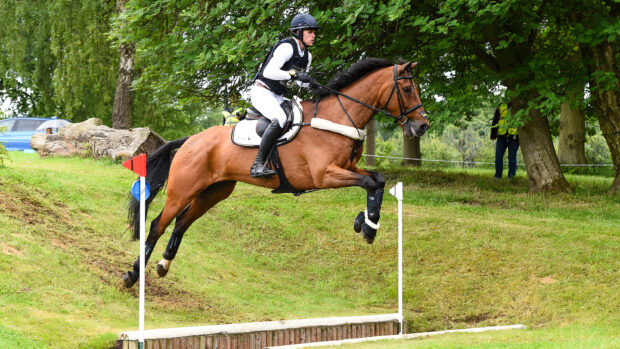The owner of a horse who was not expected to pull through after three litres of fluid had collected around his heart and lungs has paid tribute to the vets who saved him.
Sarah Hadaway was warned that her appaloosa gelding Bloxham Minnys Obama was unlikely to survive the rare pericardial effusion with which he was diagnosed last autumn. Liphook Equine Hospital specialist Jamie Prutton said he is not aware of a similar case that a horse has survived.
But after eight days in intensive care, 11 days at Liphook in total, the now 14-year-old gelding recovered – and was placed in the ridden appaloosa class at Royal Windsor Horse Show this month.
“We still don’t know what caused it; it’s a very rare condition,” Sarah told H&H. “We hope we’re out the other side now but it’s been a real team effort.”
Sarah said she had lost her other horse, Berkeley, whom she had owned for 23 years, shortly before she noticed “Obi” was not himself, last October.
“The vet came out for colic but it wasn’t that,” she said. “He just wasn’t right. Then he developed this huge swelling under his stomach and when the vet came out, he had a very raised jugular pulse. Chris, who’s a brilliant vet, said he didn’t want to alrm me but he couldn’t hear his heart, and he wanted Obi to go to Liphook. Everyone knows how brilliant they are, and we took him straight away.”
Sarah and Obi were met by three vets when they arrived; he was in congestive heart failure and the prognosis was not a bright one.
“They drained three litres of fluid off his heart and lungs,” Sarah said. “When they made the incision to put the drain in, they warned me he probably wouldn’t survive. But he did. It’s unbelievable.”
During his stay in intensive care, Obi was repeatedly scanned to check whether the fluid had returned.
“I was there every day,” Sarah said. “I’m self-employed and the nurses made me an ‘office’ outside his stable, with some upside-down tubs, so I could work. Every time they scanned him, it was fingers crossed; they went down to every other day, then Jamie [Prutton, Liphook vet] rang me to say there was still nothing there, and I thought ‘We’ve turned the corner now’.”
Obi was allowed home, on box rest for four weeks, followed by turnout, and groundwork with Sarah’s trainer Sally Billing, all under the eye of Chris Neal of Iain McKenzie Equine Practice. Then he went back to Liphook in February for Sarah to be told Obi could come back into work.
“There’s a brilliant picture of Obi being told he was ‘normal’!” Sarah said. “Southerly Roberts, who rides him, was back on him – and they came fifth at Windsor. He could have come second, but he bucked in the gallop; Chris and Iain came to Windsor to watch and they said getting him there was the victory, fifth and bucking was fine, second would have been boring!

Obi after he was told he was “normal”
“I can’t thank Chris, Iain and Jamie Prutton and his team at Liphook enough. Chris is just a brilliant vet, has given so much support to us and remained so calm when he sent us off to Liphook. Southerly stayed with Obi when the drain was inserted and she watched Obi’s heart recover, she was a real friend to him. Southerly and Sally Billing have helped me so much getting him back to work in a correct manner.”
Sarah added that she wanted to raise awareness of the condition.
“It’s very rare; not many vets have even seen it so I’d like it out there, so if you see it, do something about it,” she said.
RCVS and European internal medicine specialist Mr Prutton, one of Liphook’s clinical directors, leads the hospital’s internal medicine team, which treated Obi.
He told H&H that Obi arrived in critical condition.
“We confirmed we were unable to hear Obi’s heartbeat clearly and an ultrasound examination showed that he had a significant amount of fluid in his chest cavity and around his heart,” he said. “The fluid within the pericardium, the sac surrounding the heart, was squeezing the heart and preventing it from beating normally, which was preventing oxygen reaching his vital organs.
“At this stage, it wasn’t clear if the pericardial effusion or the pleural effusion, fluid within the chest, was causing the most significant clinical signs and to confirm the diagnosis I elected to drain the fluid around the lungs. We placed a thoracic drain in the left-hand side of Obi’s chest, through which we removed three litres of blood-tinged fluid.
“A repeat ultrasound scan showed that while the chest had drained, the pericardial sac around the heart was still full of liquid and that was compressing the heart. I performed a procedure called a pericardiocentesis, inserting a 20cm-long needle into the pericardial sac and withdrawing 500ml of blood.”
Mr Prutton said an echocardiogram showed Obi’s heart movement had improved, so he was admitted to the intensive care unit and monitored continuously for 48 hours.
“Our diligent nurses and house vets are on site 24-hours a day, ensuring he was never left alone,” he said. “His heart was closely monitored through daily echocardiograms and by 48 hours, the haemopericardium, blood in the pericardial sac, had resolved and his heartbeat was back to normal.
“Obi continued to improve and was able to go home 10 days later, and I recommended a slow return to normality, with no exercise or ridden work for three months. After that period, I performed a follow-up echocardiogram and was very pleased to see that Obi’s heart was normal.
“Obi’s condition was life-threatening and I am not aware of a similar case where a horse has survived. What caused the condition remains a mystery, but there were signs of trauma or inflammation to the base of the aorta that may have led to a bleed. The fluid in his chest will have been secondary to the pericardial effusion, with the fluid building up around the lungs due to the heart not beating normally and causing congestive heart failure. Chris did a great job referring him so quickly to Liphook and for the excellent after-care Obi received.”
You might also be interested in:

‘I thought there was no hope’: horse who broke neck makes successful return to competition

Pony written off by vets makes ‘fairytale’ comeback to winning England team

‘I’m so proud’: teenager and pony who both suffered spinal damage fight back to ride together again

Subscribe to Horse & Hound magazine today – and enjoy unlimited website access all year round
Horse & Hound magazine, out every Thursday, is packed with all the latest news and reports, as well as interviews, specials, nostalgia, vet and training advice. Find how you can enjoy the magazine delivered to your door every week, plus options to upgrade your subscription to access our online service that brings you breaking news and reports as well as other benefits.




